FINDING HER WAY HOME: UPLAKE BY ANA MARIA SPAGNA*
FINDING HER WAY HOME: UPLAKE BY ANA MARIA SPAGNA*
*First published in Entropy Magazine August 5, 2019
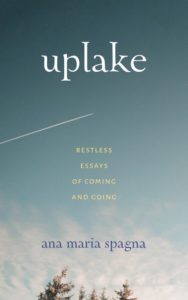 Hi Everyone! I can’t think of a better way to ring in the last summer holiday than by spending some time in the magnificent Northern Cascades with Ana Maria Spagna. Ana Maria is a beautiful writer whose portrayals of nature–and humanity–will take your breath away. Here’s my review (first published in Entropy Magazine on August 5, 2019) of her amazing book of essays, Uplake. If you want a real treat, pick up a copy!
Hi Everyone! I can’t think of a better way to ring in the last summer holiday than by spending some time in the magnificent Northern Cascades with Ana Maria Spagna. Ana Maria is a beautiful writer whose portrayals of nature–and humanity–will take your breath away. Here’s my review (first published in Entropy Magazine on August 5, 2019) of her amazing book of essays, Uplake. If you want a real treat, pick up a copy!
Stay tuned for my interview with Ana Maria, posting next week. Until then, enjoy the scenery!
How many people do you know who can say that they’ve built their own home? I don’t mean found a good architect, hired the right contractors. I’m talking hammers, wood, and chain-saws. Ana Maria Spagna and her wife Laurie built their home—from scratch—in the remote community of Stehekin, Washington. We learn this in Spagna’s stunning collection of essays, Uplake, and both the Stehekin community and the surrounding landscape are at the heart of much of her gorgeous prose.
I would venture to say that most of us have never held a chainsaw, and even fewer have used one in the wilderness, but Spagna is in relationship with her Stihl 026. In the essay “More than Noise,” Spagna’s chainsaw comes to life. It “feels like a toddler,” she writes, “and you hold it like a toddler too—firm but not tight, cautious and attentive and sometimes playful, always in motion.” The chainsaw is a metaphor for danger and power, destruction and invincibility, “reenactment” and modernity—it holds it all.
It is that push-pull, the seeming paradoxes in life that we all hold, that is the magic of Uplake. And for all its earthiness, its get down and dirty-ness, Uplake is magical.
Spagna’s Gorgeous Prose, Precise Detail, and Rich, Delicious Imagery Provide a Sensory Experience that Draws the Reader Right Up to the Edge of the Lake
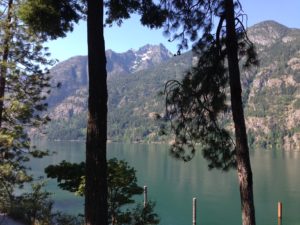 There is grandness here. In “Slow Connection,” the first essay in the collection, Spagna writes about the beauty of the place she calls home, Stehekin: “I spent my days walking by creeks too loud to hear yourself think and past views so stunning that words would never do: translucent-blue glaciers and columbine-red meadows and a thousand peaks staggering out toward the horizon like jagged incisors, like sails on the wind …”
There is grandness here. In “Slow Connection,” the first essay in the collection, Spagna writes about the beauty of the place she calls home, Stehekin: “I spent my days walking by creeks too loud to hear yourself think and past views so stunning that words would never do: translucent-blue glaciers and columbine-red meadows and a thousand peaks staggering out toward the horizon like jagged incisors, like sails on the wind …”
While Spagna knows that words could never capture the full magnificence of what she sees, hears, and smells, that doesn’t stop her from trying. She must try, and I am grateful that she does. Spagna’s gorgeous prose, precise detail, and rich, delicious imagery provide a sensory experience that draws the reader right up to the edge of the lake, right onto the trail. It is big and panoramic, these thousands of miles of wilderness, as well as big and up close: “The tree stands in the middle of the river, not in a shallow side channel, but smack in the middle of the current … but it still stands, a hundred feet tall or more, with limbs that elbow towards the sky.” There’s a theme here. Keep at it. No matter the odds. For what are we if we don’t try?
Spagna is Unafraid to Ask, But She is Not Looking for Answers. She Asks So She Can Wonder
That, too, is the magic of Uplake. Spagna keeps at it, living where she does despite the dangers that climate change has brought to her part of the world. And she keeps doing her damndest to convey the landscape, the human-scape, and the intersections of the two—examining what it is we long to know but are aware we can never fully grasp. Spagna is unafraid to ask, but she is not looking for answers. She asks so she can wonder.
Spagna questions are big ones. What is progress? What is home?
The push-pull is everywhere. Spagna searches for a way to make peace with the opposites, with conflicting needs. Regarding the chainsaw that she’s used to cut trees and clear trails, she asks, “How can you love this tool that kills what you love best?” In “Slow Connection” she tackles her own version of the disconnection/connection seesaw we all ride in our highly “connected” world. Pondering what changes high-speed internet (at the time unavailable in Steheken) would bring to her life, Spagna writes: “If someday I get high-speed internet, I sometimes think I’ll have more time for other things. But I suspect, I’ll just have more time for high-speed Internet. That’s how addiction works, isn’t it? You drink what you have.”
Such Critical Questions for Our Times
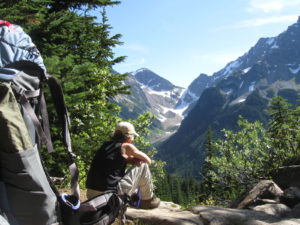 Spagna draws her attention to human nature and the tenuous lines we walk in “When We Talk about Courage.” She considers the Holocaust and Rwanda and asks, “Never again, what?” After telling stories of unsung heroes and sheroes of the civil rights era to an exuberant audience one Martin Luther King, Jr. Day at the Washington State History Museum in Tacoma, Spagna is left unsettled:
Spagna draws her attention to human nature and the tenuous lines we walk in “When We Talk about Courage.” She considers the Holocaust and Rwanda and asks, “Never again, what?” After telling stories of unsung heroes and sheroes of the civil rights era to an exuberant audience one Martin Luther King, Jr. Day at the Washington State History Museum in Tacoma, Spagna is left unsettled:
“These are rousing stories, and I can sense the museum crowd getting on board, so to speak, being moved. Who wouldn’t be? And isn’t that why I’ve come? We love to feel a part of it. We’re spectators on the sidelines, delegates at a political convention, kids at a pep rally, fans at a rock concert with lighters flickering, hoping for an encore, screaming our throats raw. One more. Just one more.”
And then, Spagna adds the kicker: “How does this collective river spill over the dike from exuberance to irrationality? From nationalism into genocide? How do you see that line?” Such critical questions for our times.
There Is Much to Admire About Spagna’s Fearlessness on the Page
Nature, even when not center stage, is often the backdrop in Uplake. Spagna examines marriage and the fear of death through the annual comings and goings of geese in “So Many Rings.” There’s the gut-wrenching “An Injured Bear,” the awe in “The Tree in the River,” and, again, more contradictions. In “Flight Delay,” Spagna writes of her mixed feeling about flying:
“I am lonelier in the air than anywhere, and I often cry still. For the beauty. For the disconnect. The land is there, right there, and so distant. You’re crowded elbow-jam close with people you don’t know, people you’ll never know, overhearing their plans … as the Earth unfurls beneath you, the same Earth you’re threatening by burning all this frivolous jet fuel. I used to be unable to look. Now, with the help of a tiny half pill, I enjoy looking. I can’t help looking. If I don’t get a window seat, I embarrass myself leaning over strangers to gawk. If, God forbid, they close the shade, I am lost.”
There is much to admire about Spagna’s fearlessness on the page . In “Post-Strayed,” a particularly poignant piece, Spagna examines her feelings about ambition; she also writes, with brutal honesty, about her envy of Cheryl Strayed’s success with the book Wild, which sold millions more copies than Spagna’s own book about the Pacific Northwest: “I spent fifteen years on the trails, and she spent three months. I had committed myself genuinely and was not passing ‘thru’ casually. Part of me wanted to believe I had earned the right to write.”
The Essays in Uplake Go Straight to the Wound
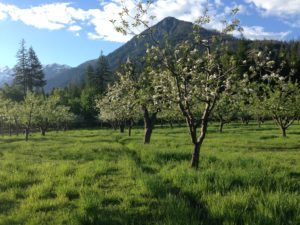 We feel Spagna’s indignation in those words—she does live in the wild, for God’s sake. But then, we are also graced with her humility:
We feel Spagna’s indignation in those words—she does live in the wild, for God’s sake. But then, we are also graced with her humility:
“…what took me a damned long time to learn is this: You don’t need years of experience to earn the right to write. In fact, when you spend all your time, say, hiking, what you get good at is hiking. Cheryl Strayed spent three months hiking, then she spent years honing the craft of writing, putting it before every aspect of her life … Strayed’s motto isn’t ‘hike like a motherfucker,’ it’s ‘write like a motherfucker.’”
Spagna admires the book, calls it beautiful, and then takes us even deeper, to a universal understanding of the feelings she struggles with: “It’s not jealousy of success so much as the near outrage we feel toward anyone who knows, even for a short time, exactly what she wants, and turns herself, as they say, body and soul to the task.”
All of the essays in Uplake go straight to the wound. They explore the messes we are surrounded by and those we surround ourselves with. Spagna does not shy away from sharing the darker side of her own humanity, and when she does, we still love her—love her even more so because of it.
Hopeful, in Spite of the Evidence of Devastating Change, She Remains
When living in “the wild,” I imagine, many of the bigger questions are hard to avoid. You cannot ignore the natural world, for one thing, as so many of us city or suburban dwellers do, to ours and the planet’s peril. Spagna brings us back—or for the first time—to, the land, the dirt, the sky.
Life amongst nature is not all romance and beauty, however. In Uplake, it is paired with drudgery and danger, and the juxtapositions are never as cruel or as haunting as in “Winter Flood.” The river beside which Spagna lives, not unlike the chainsaw, holds all. Spagna loves the river—and hates it, she claims, but I am not so sure about the latter.
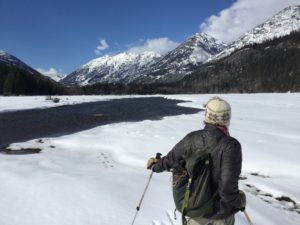 The river changes with the seasons, and the essay tells of one rough winter in particular. Two of Spagna’s friends have cancer. Their cells run wild and destructive, and Spagna likens the disease to the climate change she has been witnessing all around her. She’s seen the havoc climate change has wrecked on the river, whose floods have become wilder too, as have the forest fires that rage closer and closer to her and her neighbors’ homes.
The river changes with the seasons, and the essay tells of one rough winter in particular. Two of Spagna’s friends have cancer. Their cells run wild and destructive, and Spagna likens the disease to the climate change she has been witnessing all around her. She’s seen the havoc climate change has wrecked on the river, whose floods have become wilder too, as have the forest fires that rage closer and closer to her and her neighbors’ homes.
Spagna misses “the hope” that once felt so easy. Yet, hopeful, in spite of the evidence of devastating change, she remains. On her way back from visiting one of her cancer-ridden friends, she must ski home, as the driving has become too treacherous.
It is Love and Beauty that Win
On this trek, Spagna spots three deer: “ … there is something stunning—no matter how long you stay or how bad things get—about the whole of it: how clouds settle hard in the tops of cliff-rooted firs, how mule deer survive winters, and how water always, always, finds its own way.”
Spagna discovers beauty in the cruelty and survival, and, at the end of the essay, admits that she does not hate the river. Spagna shows her love by staying. Throughout Uplake, with all the push-pulls and the many tensions, it is love and beauty that win. And that’s all the hope I need.
As always, I’d love to hear your thoughts. Please leave a comment or send me an email!
Have a wonderful Labor Day Weekend!
See you next Friday!
Diane



Diane – Your fabulous writing about Spagna’s excellent writing
is so inspiring! Digging deep to find the words to describe what
we experience is such a challenge. I loved how you included her
jealousy about WILD and how she transformed those feelings!
Amazing.
I look forward to the interview.
Thank you, Nicky! Uplake is an amazing book, so writing about it was a joy! Ana Maria Spagna’s honesty and her ability to write it so well is inspiring!